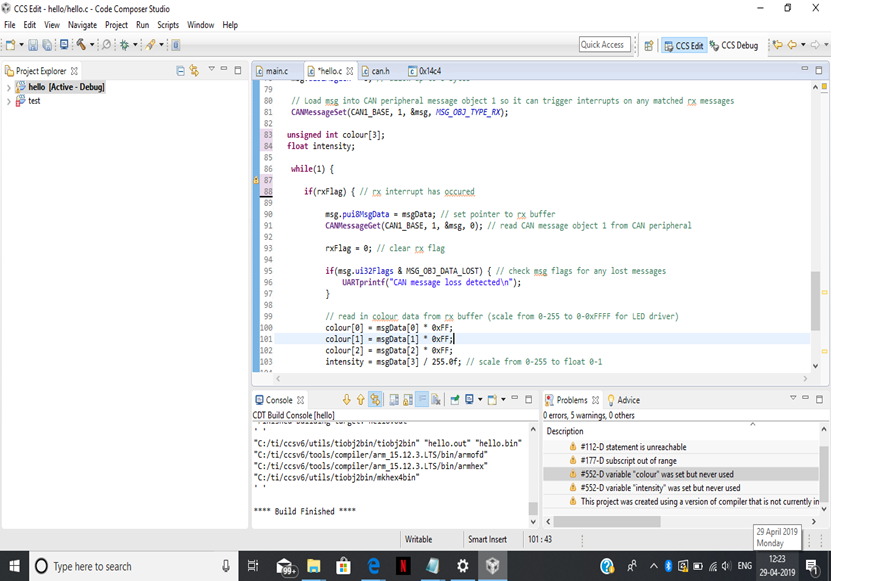Tool/software: Code Composer Studio
I am trying to compile the following program. It compiled with no error and but with some warnings . #552-D variable "colour" was set but never used. but I actually used the variable colour within while loop. Iam afraid that whether the code will work. Plz do help me
/* CAN bus LED controller slave firmware
* Written for TI Tiva TM4C123GH6PM
*/
#include <stdint.h>
#include <stdbool.h>
#include "inc/hw_memmap.h"
#include "inc/hw_types.h"
#include "driverlib/debug.h"
#include "driverlib/sysctl.h"
#include "driverlib/gpio.h"
#include "driverlib/adc.h"
#include "inc/hw_memmap.h"
#include "driverlib/uart.h"
#include "driverlib/pin_map.h"
#include "utils/uartstdio.h"
#include "inc/hw_can.h"
#include "inc/hw_ints.h"
#include "driverlib/can.h"
#include "driverlib/interrupt.h"
#include "utils/uartstdio.h"
volatile bool rxFlag = 0; // msg recieved flag
volatile bool errFlag = 0; // error flag
// CAN interrupt handler
void CANIntHandler(void) {
unsigned long status = CANIntStatus(CAN0_BASE, CAN_INT_STS_CAUSE); // read interrupt status
if(status == CAN_INT_INTID_STATUS) { // controller status interrupt
status = CANStatusGet(CAN1_BASE, CAN_STS_CONTROL);
errFlag = 1;
} else if(status == 1) { // msg object 1
CANIntClear(CAN1_BASE, 1); // clear interrupt
rxFlag = 1; // set rx flag
errFlag = 0; // clear any error flags
} else { // should never happen
UARTprintf("Unexpected CAN bus interrupt\n");
}
}
int main(void) {
tCANMsgObject msg; // the CAN msg object
unsigned char msgData[8]; // 8 byte buffer for rx message data
// Run from crystal at 50Mhz
SysCtlClockFreqSet((SYSCTL_XTAL_25MHZ | SYSCTL_OSC_MAIN | SYSCTL_USE_PLL | SYSCTL_CFG_VCO_480), 120000000);
// Set up debugging UART
SysCtlPeripheralEnable(SYSCTL_PERIPH_GPIOA);
SysCtlPeripheralEnable(SYSCTL_PERIPH_UART0);
GPIOPinConfigure(GPIO_PA0_U0RX);
GPIOPinConfigure(GPIO_PA1_U0TX);
GPIOPinTypeUART(GPIO_PORTA_BASE, GPIO_PIN_0 | GPIO_PIN_1);
UARTStdioConfig(0, 115200, SysCtlClockGet());
SysCtlPeripheralEnable(SYSCTL_PERIPH_GPIOB); // enable CAN1 GPIO peripheral
GPIOPinConfigure(GPIO_PB0_CAN1RX);
GPIOPinConfigure(GPIO_PB1_CAN1TX);
GPIOPinTypeCAN(GPIO_PORTB_BASE, GPIO_PIN_0 | GPIO_PIN_1);
SysCtlPeripheralEnable(SYSCTL_PERIPH_CAN1);
CANInit(CAN1_BASE);
//CANBitRateSet(CAN1_BASE, SysCtlClockGet(), 500000);
CANBitRateSet(CAN1_BASE, 120000000 , 500000);
CANIntRegister(CAN1_BASE, CANIntHandler); // use dynamic vector table allocation
CANIntEnable(CAN1_BASE, CAN_INT_MASTER | CAN_INT_ERROR | CAN_INT_STATUS);
CANIntClear(CAN1_BASE,CAN_INT_STATUS);
IntEnable(INT_CAN1);
CANEnable(CAN1_BASE);
// Use ID and mask 0 to recieved messages with any CAN ID
msg.ui32MsgID = 0;
msg.ui32MsgIDMask = 0;
msg.ui32Flags = MSG_OBJ_RX_INT_ENABLE | MSG_OBJ_USE_ID_FILTER;
msg.ui32MsgLen = 8; // allow up to 8 bytes
// Load msg into CAN peripheral message object 1 so it can trigger interrupts on any matched rx messages
CANMessageSet(CAN1_BASE, 1, &msg, MSG_OBJ_TYPE_RX);
unsigned int colour[3];
float intensity;
while(1) {
if(rxFlag) { // rx interrupt has occured
msg.pui8MsgData = msgData; // set pointer to rx buffer
CANMessageGet(CAN1_BASE, 1, &msg, 0); // read CAN message object 1 from CAN peripheral
rxFlag = 0; // clear rx flag
if(msg.ui32Flags & MSG_OBJ_DATA_LOST) { // check msg flags for any lost messages
UARTprintf("CAN message loss detected\n");
}
// read in colour data from rx buffer (scale from 0-255 to 0-0xFFFF for LED driver)
colour[0] = msgData[0] * 0xFF;
colour[1] = msgData[1] * 0xFF;
colour[2] = msgData[2] * 0xFF;
intensity = msgData[3] / 255.0f; // scale from 0-255 to float 0-1
// write to UART for debugging
UARTprintf("Received colour\tr: %d\tg: %d\tb: %d\ti: %d\n", msgData[0], msgData[1], msgData[2], msgData[3]);
// set colour and intensity
//RGBSet(colour, intensity);
}
}
return 0;
}
warning screenshot


